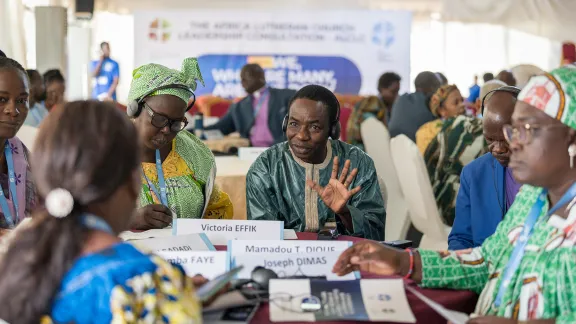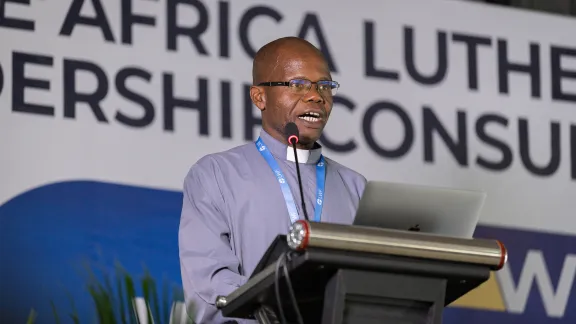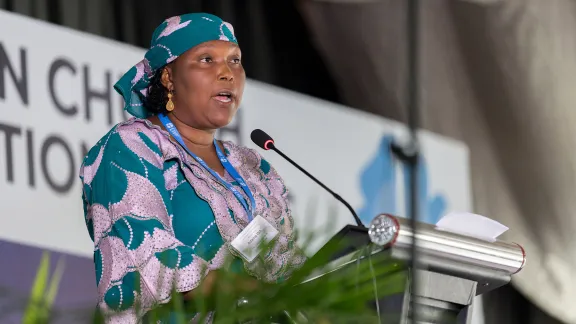
Group discussion and sharing among participants of the ALCLC in Abuja, Nigeria. Photo: LWF/Albin Hillert
Theological institutions promoting unity in Africa’s churches
(LWI) - Representatives of three educational institutions of The Lutheran Federation’s (LWF) Africa region led sessions during the 2024 Africa Lutheran Church Leadership Consultation (ALCLC) in Abuja, Nigeria. Taking up the conference theme “We who are many, are one body” (1 Cor 10:17) they reflected on theological, social and cultural aspects of strengthening churches in the region.
Rev. Prof. Dr Faustin Mahali from Tumamini University Makumira (TUMA), Tanzania, spoke on “Theology, gender and leadership education in Africa.”
Dr Ebissé Abdissa Gudeta is the first female academic dean of the Ethiopian Evangelical Church Mekane Yesus seminary. Her contribution was titled “Church leadership in context – seeking justice and unity.”
Rev. Dr Adama Isa is a lecturer at Bronnum Lutheran Seminary in Nigeria. She spoke on “Building strong fellowship in the church – youth, men and women: Hope for a renewal of faith in the churches in Africa.”

Rev. Prof. Dr Faustin Mahali from Tumamini University Makumira, Tanzania. Photo: LWF/Albin Hillert
The ordained priesthood through baptism should not be limited to roles assigned by culture but by a desire by both men and women to decide together and complement each other as stewards of God.
Rev. Prof. Dr Faustin Mahali, Tumamini University Makumira
Women and men mutually serving the church
As the LWF’s Theology, Gender Justice and Leadership Education (TGLE) program, currently hosted by TUMA, is set to move to Cameroon and francophone Africa, Faustin Mahali presented some of his experiences gained in Tanzania in the past years.
“I count this as a crucial output of the LWF Hélène Ralivao Fund’s purpose of supporting theological education for gender-inclusive leadership in our churches,” said Mahali. “To achieve this goal, African theological Institutions have endeavored to equip participants with tailor-made theological education programs with practical knowledge and skills to critique theological teaching that promotes gender disparity in different areas of church leadership, including ordained ministry.”
“The ordained priesthood through baptism should not be limited to roles assigned by culture but by a desire by both men and women to decide together and complement each other as stewards of God,” Mahali said. “When we mutually exist and decide together as consecrated men and women through baptism in Christ, we cannot assign the role of leadership and ordained ministry to men alone.”
Mahali said, “Lutheran churches in Africa still have an indispensable assignment to address inequality between men and women in the church and society.” Also, he found it “crucial for churches in Africa to invest more in biblical-theological reflections to promote gender justice.”
“It would be a great honor to pioneer woman theologian Hélène Ralivao if the recruitment of theologians is discussed between institutions and sending churches,” said Mahali. “This might help increase the number of women who qualify for enrolment into theological education, which is the prerequisite for ordained ministry and leadership in the church.”
In addition, “concerted efforts are needed to implement LWF and local churches’ gender justice policy,” Mahali said, “to impact the inclusivity of men and women in the ministry of God.”
Leadership is not about taking a position of power but using that power as an instrument which ensures unity and justice.
Dr Ebissé Gudeta, Ethiopian Evangelical Church Mekane Yesus seminary

Dr Ebissé Abdissa Gudeta is the first female academic dean of the Ethiopian Evangelical Church Mekane Yesus seminary. Photo: LWF/Albin Hillert
Inclusive, empathetic, and just leadership in the church
In her presentation, Ebissé Gudeta strongly emphasized “the necessity of inclusive, empathetic leadership to ensure justice and unity in the church.” From her personal journey, she knew that “leadership is not about taking a position of power but using that power as an instrument which ensures unity and justice.”
She shared examples of inclusive leadership models from the African context.
The Ubuntu leadership philosophy “promotes a people-centered approach that values respect and dignity, transcending age, gender, religion, and ethnicity,” Gudeta said. “Leaders are expected to care for the community's well-being, and decision-making is shared to ensure unity and justice. This philosophy allows men, women, youth, and children to contribute to the betterment of the family and church.”
In many African communities, the Palaver tree serves as a gathering space for storytelling, problem-solving, and open communication. The Palaver Tree model emphasizes “open dialogue and reconciliation in decision-making,” ensuring “all voices are heard.” Having meals together after the meetings is “a sign of communion gathering and sealing a covenant of love together and witnessed by all.”
The Gadaa system, practiced by the Oromo people of Ethiopia, “is a democratic leadership structure,” Gudeta explained. Power is transferred every eight years to a new leader elected by the assembly, ensuring social cohesion and justice within the community. “It regulates political, social, and religious activities, promoting social cohesion, conflict resolution, and the protection of women’s rights,” she said.
From a Biblical perspective, “seeking justice is central to God’s calling for leaders,” Gudeta went on, while “Christian unity is another cornerstone of church leadership.” Considering that, women's leadership “as a path of inclusivity, justice, and equality in the African context” needed to be enhanced, Gudeta said, to shape “an African theology and African church representing both male and female voices.”

Rev. Dr. Adama Isa is a lecturer at Bronnum Lutheran Seminary in Nigeria. Photo: LWF/Albin Hillert
The future of African churches depends on their ability to cultivate strong, inclusive fellowship among men, women and youth.
Rev. Dr Adama Isa, Bronnum Lutheran Seminary, Nigeria
Building strong fellowship in Africa’s churches
In her presentation, Adama Isa said that the future of African churches “depends on their ability to cultivate strong, inclusive fellowship among men, women and youth” by promoting active participation.
Isa said youth-centered worship and leadership in church activities were vital for young people. “That creates ownership and commitment.” Also, churches' presence on digital platforms is a way to “meet them where they spend time,” she is convinced. To meet the challenges of young people in Africa, such as joblessness and poverty, churches needed to engage in programs to alleviate these risks.
Isa called on men to take responsibility for their families, the church, and the communities. “Homes that are well will enhance the well-being of society,” she said. While women and youth attended many church activities, men were often absent. However, she sees an essential role for them to “speak up against violence and advocate for justice in the public space,” particularly regarding the rights of women and youth.
Isa said that women needed to become more involved in decision-making, and their leadership roles strengthened. That would also promote addressing gender-based and other forms of violence, which the church needed to speak up about.
Isa said intergenerational integration and the church's holistic mission were closely related and could promote service-oriented outreach. “People’s place is not only within the church,” Isa said. Providing training, e.g., for financial management, promoting health or organizing cultural activities, could be expressions of this.


